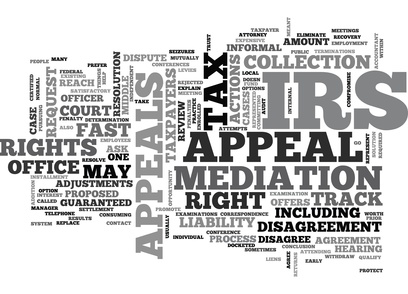
There are instances when taxpayers do not agree with the IRS on certain tax issues. In such instances, if the taxpayer wants they can take the case to the tax court. However, going to the court would require the taxpayer to invest a lot of time, money, and effort. To avoid this, taxpayers have the option of approaching the appeals office, which is an independent body within the IRS. As the appeals office is completely independent of the IRS department that conducted the examination, the taxpayer can rest assure of a fair and transparent proceeding.
If you have a tax disagreement with the IRS and would want to appeal within the IRS, here is all you need to know about it.
Requesting a Conference with an Appeals Officer
As a taxpayer, you can request for a conference with the appeals officer. The instructions for requesting a conference are mentioned in the Audit Letter 950 that the IRS tax examination department sends out to the taxpayer to inform them about an increase or decrease in their tax liability. If the taxpayer does not agree with the tax adjustments in the Audit Letter and requests for a conference, the examiner forwards it further to the appeals office to arrange for a conference at a convenient place and time.
How is The Conference Conducted and Who Needs to Attend it?
These conferences may be conducted in person, on telephone, or through correspondence. You may have an authorized legal representative to participate in the conference on your behalf.
Remember – Only Certified Public Accountants, Attorneys, and Enrolled Agents can represent a taxpayer in the conference with the Appeals office. You can have an unenrolled preparer be a witness at the conference, but they cannot represent a taxpayer.
Ways to Request a Conference
File a Small Case Request
A taxpayer can make a small case request when the total amount of tax, penalties, and the amount of interest for each period is less than or equal to $25,000. The total amount is the amount including the claimed refunds and the proposed tax increase or decrease. In order to file a small case request, the taxpayer needs to send a written statement mentioning the changes that they do not agree with, and the reason for their disagreement. Make sure you send the protest within 30 days from the date of receiving the letter.
File a Formal Written Protest
Here is the information a taxpayer must provide in their written formal protest.
- Name, Address, and Daytime phone number of the Taxpayer
- A statement which clearly states that the taxpayer wants to file an appeal
- A copy of the proposed tax adjustment
- The periods involved
- The facts or reasonings supporting the taxpayer’s disagreement
- Supporting law, a basis which the taxpayer filed the claim
- Sign of the taxpayer or their representative on the written protest, stating that it is true.
Want a Free Consultation?
If you are facing an IRS tax issue and want a qualified IRS tax attorney to represent you at the appeals office, contact us at the Law Offices of Nick Nemeth. We offer a free, no-obligation consultation wherein you can discuss your tax problems with us. It is a one-on-one meeting and is completely confidential and private in order to figure out your best options. To schedule an appointment, call us at(972) 426-2553.


